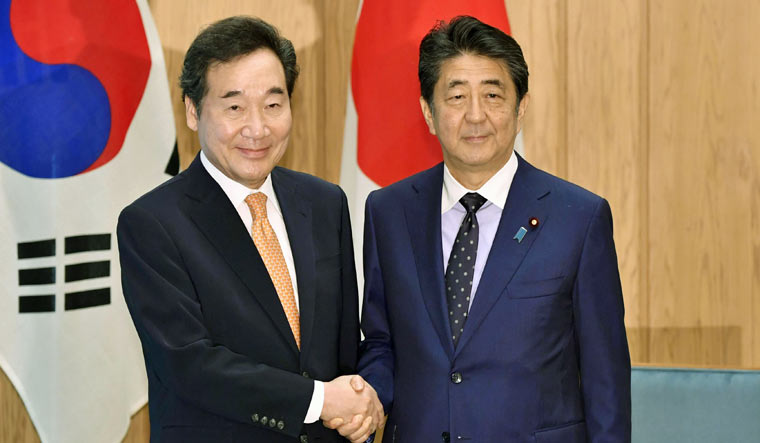South Korea's Lee Nak-yon handed Japanese leader Shinzo Abe a letter from South Korean President Moon Jae-in while they met for the first high-level meeting since the neighbours' relations nosedived over trade and history disputes, 13 months ago.
Lee attended Emperor Naruhito's enthronement ceremony Tuesday before meeting with Abe.
Both prime ministers agreed on the importance of improving ties but made no apparent breakthrough on Thursday.
Ties between Tokyo and Seoul, deteriorated since South Korea’s top court last October ordered some Japanese firms to compensate Koreans forced to work in their wartime mines and factories.
According to Japan, however, the matter was settled by a 1965 treaty, that called the decision a violation of international law. Japan also maintained that compensation issues of South Korean women who were held as sex slaves at front-line brothels for Japanese soldiers, were settled under the 1965 bilateral treaty under which Tokyo provided $500 million in economic cooperation.
The trade spat has also spilt over to security issues. South Korea in August announced a decision to terminate a bilateral military intelligence-sharing pact despite North Korea's resumption of missile tests over the last several months, triggering Washington's concern. The pact is set to expire in late November.
“Relations are currently in quite a severe state but should not be left that way. If South Korea can keep bilateral promises, that could be a chance to return to a healthy relationship,” Abe said. Abe expressed during the meeting that South Korea should keep its promise, per the 1965 agreement.
The spat between the two nations had escalated when Japan imposed export controls on materials vital for South Korean chipmakers and dropped Seoul from a list of countries eligible for fast-track exports. Both measures were denounced by South Korea.
Moon's letter congratulated Japan on the new imperial era of Reiwa and wished for an improvement in bilateral ties, said an official in Seoul. Abe expressed his gratitude for the letter, said South Korea's first vice foreign minister, Cho Sei-yong.
Cho said Lee and Abe agreed the two countries must improve their ties and that coordination between them and with Washington was important. Lee called for promoting diverse communications and exchanges to try to resolve their frayed ties, Cho said.
Lee, who is known as a Japan expert, didn't disclose more details about the talks as he left Abe's office.
According to the Japanese Foreign Ministry, Abe told Lee that cooperation between the two nations is crucial as they face North Korean nuclear and missile threats. He added that Seoul should take the first step to mend strained relations.
The talks reported very little progress. Japan's Chief Cabinet Secretary Yoshihide Suga said the talks were "meaningful" as the two sides exchanged views and reassured that their efforts are continuing.


